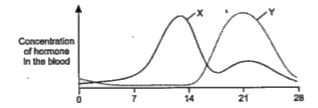At the start of the menstrual cycle, the lining of the uterus wall breaks down. As each follicle in the ovaries develops, the amount of oestrogen produced by the ovary increases. The oestrogen act on the uterus and cause its lining to become thicker and develop more blood vessels. These are changes that help an early embryo to implant. Two hormones, follicle-stimulating hormone (FSH) and luteinising hormone (LH) promote ovulation. Once the ovum has been released, the follicle that produced it develops into a solid body called the corpus luteum. This produces a hormone called progesterone, which affects the uterus lining in the same way as the oestrogens, making it grow thicker and produce more blood vessels. If the ovum is fertilised, the corpus luteum continues to release progesterone and so keeps the uterus in a state suitable for implantation. If the ovum is not fertilised, the corpus luteum stops producing progesterone. As a result, the thickened lining of the uterus breaks down and loses blood, which escapes through the cervix and vagina.
Two hormones, X and Y, are secreted by the ovaries. The graph shows the concentrations of these hormones in the blood during one complete menstrual cycle. What are hormones X and Y?

A
Hormone X is oestrogen and Y is progesterone.
B
Hormone X is progesterone and Y is oestrogen.
C
Hormone X is FSH and Y is LH.
D
Hormone X is LH and Y is FSH.
Text Solution
The correct Answer is:A
Hormone X is oestrogen and Y is progesterone.
|
Updated on:21/07/2023
Topper's Solved these Questions
- BOOK - ICSECHAPTER - HUMAN REPRODUCTIONEXERCISE - ASSERTION AND REASON5videos
HUMAN REPRODUCTION
- BOOK - ICSECHAPTER - HUMAN HEALTH AND DISEASE EXERCISE - COMPETITION CORNER (OBJECTIVE TYPE QUESTIONS) (Assertion and Reason Type Questions (For AIIMS aspirants))28videos
HUMAN HEALTH AND DISEASE
- BOOK - ICSECHAPTER - ISC BOARD PAPER (2019 -BIOLOGY)EXERCISE - PART-II ( SECTION-C)12videos
ISC BOARD PAPER (2019 -BIOLOGY)
Similar Questions
Knowledge Check
- Question 1 - Select One
Luteinising hormone (LH) in female
AHelps in the appearance of secondary sexual charactersBStimulates ovary to secrete oestradiolCHelps in release of the ovum from the ovaryDControls the blood pressure - Question 2 - Select One
Follicle stimulating hormone (FSH) is secreted by
AThyroid glandBAnterior pituitaryCPosterior pituitaryDGonad. - Question 3 - Select One
Follicle - stimulating hormone is to estrogen as luteinizing hormone is to
AvasopressinBtestosteroneCprogesteroneDandrogen
Follicle - stimulating hormone is to estrogen as luteinizing hormone is to
View SolutionWhat role does luteinising hormone (LH) play in the ovarian cycle?
View SolutionWhat role does luteinising hormone (LH) play in the ovarian cycle?
View SolutionName the hormone described in each statement below.
Hormone converts the empty follicle into the corpus luteum and stimulates it to produce progesterone.View SolutionThe Hormone that prepares the uterus for the implantation of the embryo is
View Solution

